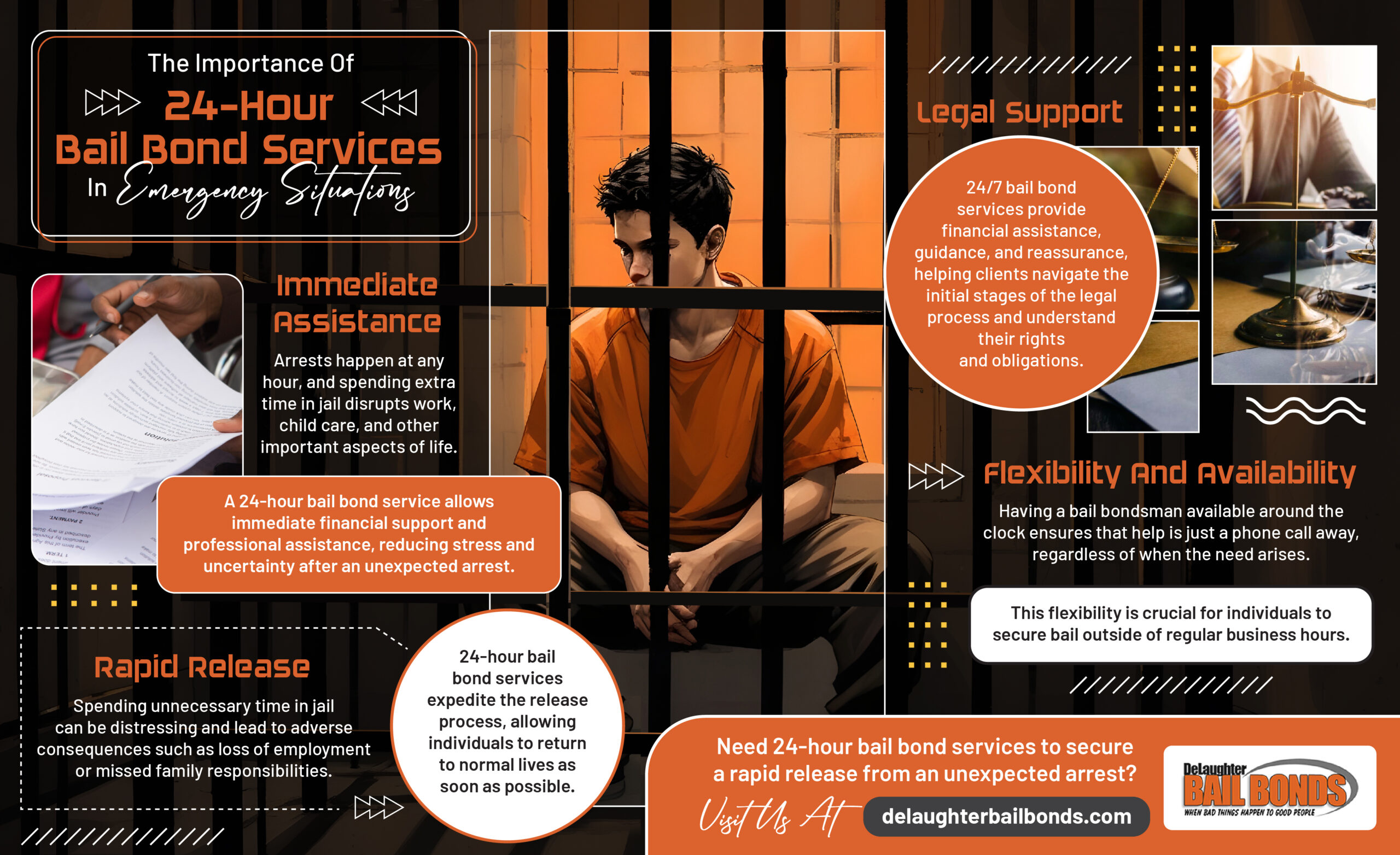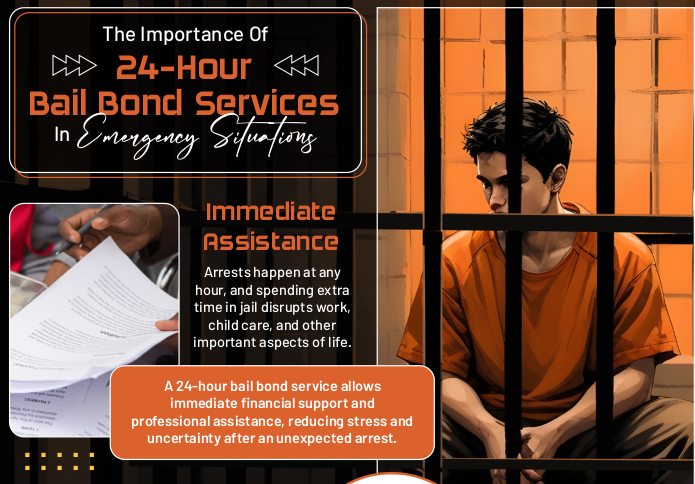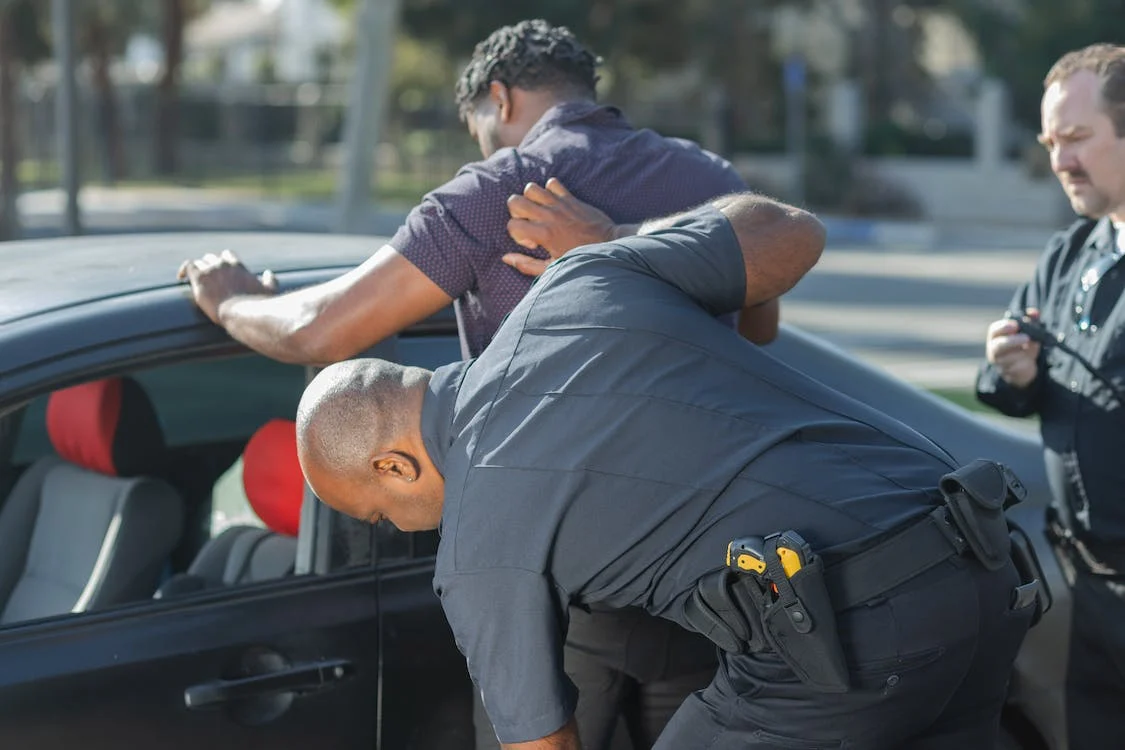A 24-hour bail bond service allows immediate financial support and professional assistance, reducing stress and uncertainty after an unexpected arrest.


A 24-hour bail bond service allows immediate financial support and professional assistance, reducing stress and uncertainty after an unexpected arrest.


Being arrested is a disorienting experience, one that often unfolds unexpectedly. In Grant County, when law enforcement intervenes, individuals find themselves thrust into a legal process that can be confusing and daunting. Whether it’s a minor infraction or a serious offense, the journey from arrest to release begins with the initial encounter with law enforcement.
After the arrest, individuals are taken to the Grant County detention center for booking and processing. Here, personal information is recorded, fingerprints are taken, and photographs are snapped. This step marks the formal entry into the legal system, setting the stage for the subsequent proceedings.
For many, securing release hinges on posting bail. In Grant County, this is where bail bondsmen come into play. These professionals provide a lifeline to individuals caught in the labyrinth of legal proceedings. Bail bonds allow individuals to secure release by paying a percentage of the total bail amount, typically 10% in Grant County. This financial arrangement bridges the gap between confinement and freedom, offering a temporary reprieve while legal matters unfold.
Once bail is posted, the next step is a bail hearing. Here, a judge assesses the case’s circumstances and determines whether the defendant is eligible for release and under what conditions. Factors such as flight risk, criminal history, and the severity of the charges are taken into account. The outcome of this hearing shapes the trajectory of the individual’s journey through the legal system.
For those granted release, compliance with set conditions is paramount. These may include regular check-ins with a probation officer, refraining from certain activities or places, or adhering to travel restrictions. Violating these conditions can result in the revocation of bail and a return to custody, prolonging the legal ordeal.

As the legal process unfolds, the journey from arrest to release nears its resolution. Court appearances, negotiations, and potential trials mark the final stretch. For some, this journey culminates in exoneration or a favorable verdict. For others, it may entail accepting responsibility and facing the consequences. Regardless of the outcome, the journey leaves an indelible mark, shaping perspectives and priorities for the future.
If you or a loved one find yourselves entangled in the legal system in Grant County, don’t face it alone. DeLaughter Bail Bonds is here to offer swift and reliable assistance. Our experienced bail bondsmen understand the intricacies of the legal process and are dedicated to guiding you through every step of securing bail bonds. Contact DeLaughter Bail Bonds today to ensure a smoother journey through the legal maze.

In today’s legal landscape, the accessibility of offender records plays a pivotal role in upholding transparency and fairness within the justice system. Accessible offender records not only benefit the public but also contribute to the effective functioning of law enforcement agencies and judicial processes. Let’s delve into the significance of advocating for accessible offender records, particularly in regions like Allen County, where ensuring transparency in legal proceedings is of paramount importance.
Accessible offender records serve as a cornerstone of transparency and accountability within the criminal justice system. They provide crucial information about individuals’ criminal histories, aiding law enforcement agencies in their investigative processes and helping prosecutors build strong cases. Moreover, accessible records empower the public to make informed decisions, whether it’s regarding safety concerns, employment background checks, or personal interactions.
One crucial aspect where accessible offender records play a significant role is in the bail process. Affordable bail bonds are essential for individuals awaiting trial to avoid prolonged pretrial detention, especially for those who may not have the financial means to post bail independently. Bail bondsmen often rely on accessible offender records to assess the risks associated with providing bail bonds, ensuring a fair and just bail process for all individuals, regardless of their socioeconomic status.
Despite the importance of accessible offender records, challenges persist in many jurisdictions, including Allen County. Limited resources, outdated record-keeping systems, and bureaucratic hurdles can hinder timely access to vital information. Moreover, disparities in access to technology and information among marginalized communities exacerbate the problem, perpetuating systemic inequalities within the justice system.
Advocating for accessible offender records entails addressing these systemic challenges through legislative reform, technological innovation, and community engagement. In Allen County and beyond, grassroots organizations, legal advocates, and policymakers are working together to promote initiatives that enhance the transparency and accessibility of offender records. This includes advocating for the modernization of record-keeping systems, promoting data sharing among law enforcement agencies, and expanding access to online databases for the public.
At DeLaughter Bail Bonds, we understand the critical importance of access to justice for all individuals, regardless of their financial circumstances. Serving the community of Allen County, we are committed to providing affordable bail bonds and ensuring that everyone has the opportunity to exercise their legal rights. If you or a loved one is in need of assistance with bail, our experienced bail bondsmen are here to help navigate the process with compassion and efficiency. Contact DeLaughter Bail Bonds today to learn more about our services!

In the realm of law enforcement, the term “Thin Blue Line” represents the delicate balance between order and chaos, with police officers serving as the guardians of society’s peace and security. However, this noble responsibility comes with the crucial need for transparency and accountability, particularly concerning police records and the mechanisms ensuring law enforcement’s adherence to ethical standards. In this blog post, we delve into the significance of police records and accountability, shedding light on their role in maintaining trust and justice within communities.
Police records serve as the cornerstone of accountability within law enforcement agencies. These records encompass a wide array of information, including incident reports, arrest records, body camera footage, and disciplinary actions. Accessible police records not only facilitate transparency but also empower citizens to hold law enforcement accountable for their actions.
In Grant County, the availability of comprehensive police records plays a vital role in fostering trust between law enforcement and the community. Citizens have the right to request access to these records, ensuring that accountability remains a fundamental aspect of policing practices.
One area where accountability intersects with community welfare is the realm of bail bonds. Affordable bail bonds are essential for ensuring that individuals awaiting trial can maintain their livelihoods and support their families. However, the bail system often perpetuates inequalities, disproportionately affecting marginalized communities.
In Grant County, proactive measures are being taken to address this issue. Bail bondsmen play a pivotal role in providing access to affordable bail bonds, thereby mitigating the socioeconomic disparities inherent in the current bail system. By working closely with local authorities and community organizations, bail bondsmen in Grant County are contributing to a more equitable justice system.

In the digital age, technology has emerged as a powerful tool for enhancing police accountability. Body cameras, dash cams, and electronic record-keeping systems offer invaluable insights into law enforcement interactions and procedures. By leveraging technology, law enforcement agencies can bolster transparency and accountability, ensuring that officers uphold the highest ethical standards in their duties.
Are you or a loved one in need of assistance navigating the complexities of the legal system in Grant County? Look no further than DeLaughter Bail Bonds. Our team of experienced bail bondsmen is dedicated to providing affordable bail bonds to individuals facing difficult circumstances. We understand the importance of maintaining financial stability while awaiting trial, and we’re here to help. Contact us today to learn more about our services and how we can support you during this challenging time.

From Arrest To Release: Tracing The Journey

Understanding Life in Prison: Life in prison is a complex tapestry woven with tales of struggle, resilience, and redemption. For inmates, each day presents unique challenges, from adapting to the structured routine to navigating social hierarchies within the prison walls. Emotions oscillate between hope and despair as individuals grapple with the consequences of their actions and yearn for a chance at redemption.
The Role of Affordable Bail Bonds: In the labyrinth of the legal system, securing pretrial release can often hinge on financial capabilities. Affordable bail bonds offer a lifeline to those who cannot post the full bail amount set by the court. By paying a fraction of the bail upfront, individuals can secure their release while awaiting trial, ensuring they can continue their lives outside of prison walls, maintain employment, and support their families.
Navigating the Bail Bondsmen System: Bail bondsmen play a pivotal role in the process of securing bail. These licensed professionals act as intermediaries, posting the full bail amount on behalf of the defendant for a fee that is non-refundable, around 10% of the bail amount. In Fulton County, bail bondsmen serve as guides through the legal maze, offering support and assistance to individuals and families grappling with the complexities of the justice system.
Challenges and Opportunities: Despite the lifeline provided by affordable bail bonds, challenges persist. For many, the journey through the legal system is fraught with uncertainty and financial strain. Moreover, the stigma associated with incarceration can cast a long shadow, impacting employment prospects and social relationships long after release. However, amidst these challenges lie opportunities for growth and transformation. Programs aimed at rehabilitation and reintegration offer hope for a brighter future beyond the prison walls.

Life behind prison walls is a multifaceted journey marked by trials and triumphs. By understanding the nuances of incarceration and the role of affordable bail bonds and bondsmen, we can strive toward a more equitable and just society.
Do you know someone who’s terrified by the prospect of facing prison in Fulton County? Don’t fret because DeLaughter Bail Bonds is here to help. Our team of expert bail bondsmen comprehends the adversity they are facing and is dedicated to offering affordable bail bonds tailored to their needs. Don’t let the complexities of the legal system dictate their future; reach out to DeLaughter Bail Bonds today and take the first step towards securing their freedom.

In the legal system, bail bonds are lifelines, especially when finances are tight.


Discover the lasting impacts of bail, from financial strain to emotional tolls, and find support in your community.


Juvenile development is a critical phase where individuals navigate various challenges and opportunities that can significantly shape their futures. While there’s a spotlight on risk factors that predispose juveniles to adverse outcomes, it’s equally vital to understand the role of protective factors that can mitigate these risks and foster resilience. In this blog, we delve into the significance of protective factors in juvenile development, particularly in the context of Elkhart County, and explore how measures like affordable bail bonds can contribute to fostering resilience in young individuals.
Protective factors are conditions or attributes in individuals, families, communities, or the larger society that mitigate risks and promote positive development. In the realm of juvenile development, these factors serve as buffers against various adversities, ranging from family dysfunction to community violence. They encompass aspects such as strong familial bonds, supportive social networks, access to education, and community resources, among others.
In Elkhart County and beyond, access to affordable bail bonds can be a crucial protective factor for juveniles entangled in the criminal justice system. Research indicates that pretrial detention, often due to unaffordable bail, can exacerbate the likelihood of negative outcomes for juveniles, including increased likelihood of reoffending and disruption of educational pursuits. Affordable bail bonds ensure that juveniles can await trial in their communities, maintaining ties with family and support networks, which are vital protective factors.
Another essential protective factor lies in the presence of supportive networks, both within families and communities. Bail bondsmen in Elkhart County and similar locales often serve as integral members of these networks, offering not only financial assistance but also guidance and support to juveniles and their families during challenging times.

Access to education is widely recognized as a potent protective factor in juvenile development. However, interactions with the justice system, including incarceration or extended periods of pretrial detention, can disrupt educational trajectories. In the journey from risk factors to resilience, understanding and bolstering protective factors are paramount in fostering positive outcomes for juveniles. Affordable bail bonds, alongside supportive networks and access to education, serve as vital pillars in this endeavor, particularly in locales like Elkhart County.
Are you or a loved one facing the daunting prospect of incarceration in Elkhart County? DeLaughter Bail Bonds is here to provide you with reliable and affordable bail bond services, ensuring that you can secure your freedom swiftly and efficiently. Our team of experienced bail bondsmen understands the challenges you’re facing and is dedicated to guiding you through the process with compassion and expertise. Contact DeLaughter Bail Bonds today!

When it comes to prisons and incarceration, misconceptions abound. The media often portrays prisons as places solely for punishment, while rehabilitation remains a mere afterthought. However, delving deeper reveals a more nuanced reality. In this blog, we’ll explore and debunk some of the most common misconceptions surrounding prisons.
One prevailing misconception is that prisons serve only as punishment centers. While punishment is indeed a component of the justice system, modern correctional facilities increasingly emphasize rehabilitation. Programs ranging from vocational training to therapy aim to reintegrate inmates into society successfully. By focusing solely on punishment, we overlook the potential for positive change and rehabilitation within the prison system.
In popular culture, the notion of posting bail seems straightforward. However, the reality is starkly different, particularly for those from marginalized communities. Affording bail can be a significant challenge, leading many individuals to languish in pretrial detention simply because they cannot afford to pay. The lack of accessible and affordable bail bonds perpetuates inequality within the justice system, further entrenching individuals in cycles of poverty and incarceration.
Bail bondsmen are often portrayed as saviors who assist individuals in securing their release from jail. However, the truth is more complex. While bail bondsmen in Noble County provide a service, it often comes at a high cost, particularly for those already facing financial hardship. Additionally, the reliance on bail bondsmen can perpetuate a cycle of debt, further exacerbating the challenges individuals face upon release. Furthermore, the bail bonds system disproportionately affects marginalized communities, highlighting its inherent inequities.

To address these misconceptions effectively, education and advocacy are paramount. By promoting a deeper understanding of the complexities within the criminal justice system, we can challenge existing narratives and work towards meaningful reform. This includes advocating for alternatives to cash bail, such as risk assessments and community-based supervision programs.
By debunking common misconceptions about prisons, we can foster a more compassionate and just society. Through education, advocacy, and a commitment to reform, we can create a system that prioritizes rehabilitation and reduces recidivism, ultimately leading to safer and more prosperous communities for all.
When it comes to securing affordable bail bonds in Noble County, DeLaughter Bail Bonds is the name you can trust. Our team of dedicated bail bondsmen is committed to providing prompt and reliable service to individuals in need, ensuring that you can access the assistance you require during challenging times. Contact DeLaughter Bail Bonds today, and let us help you navigate the legal maze with confidence and ease.